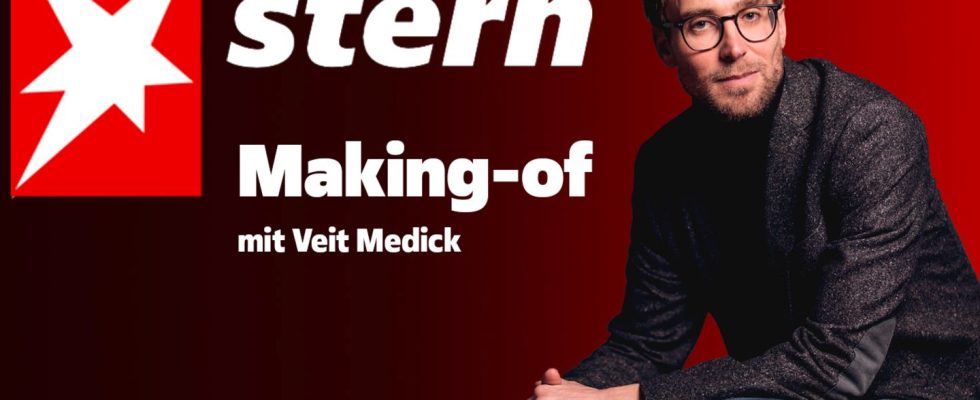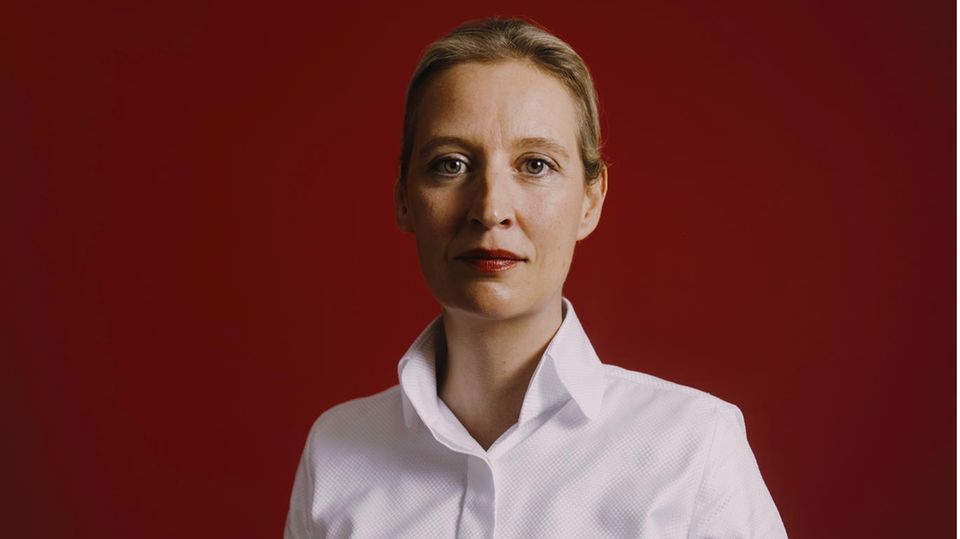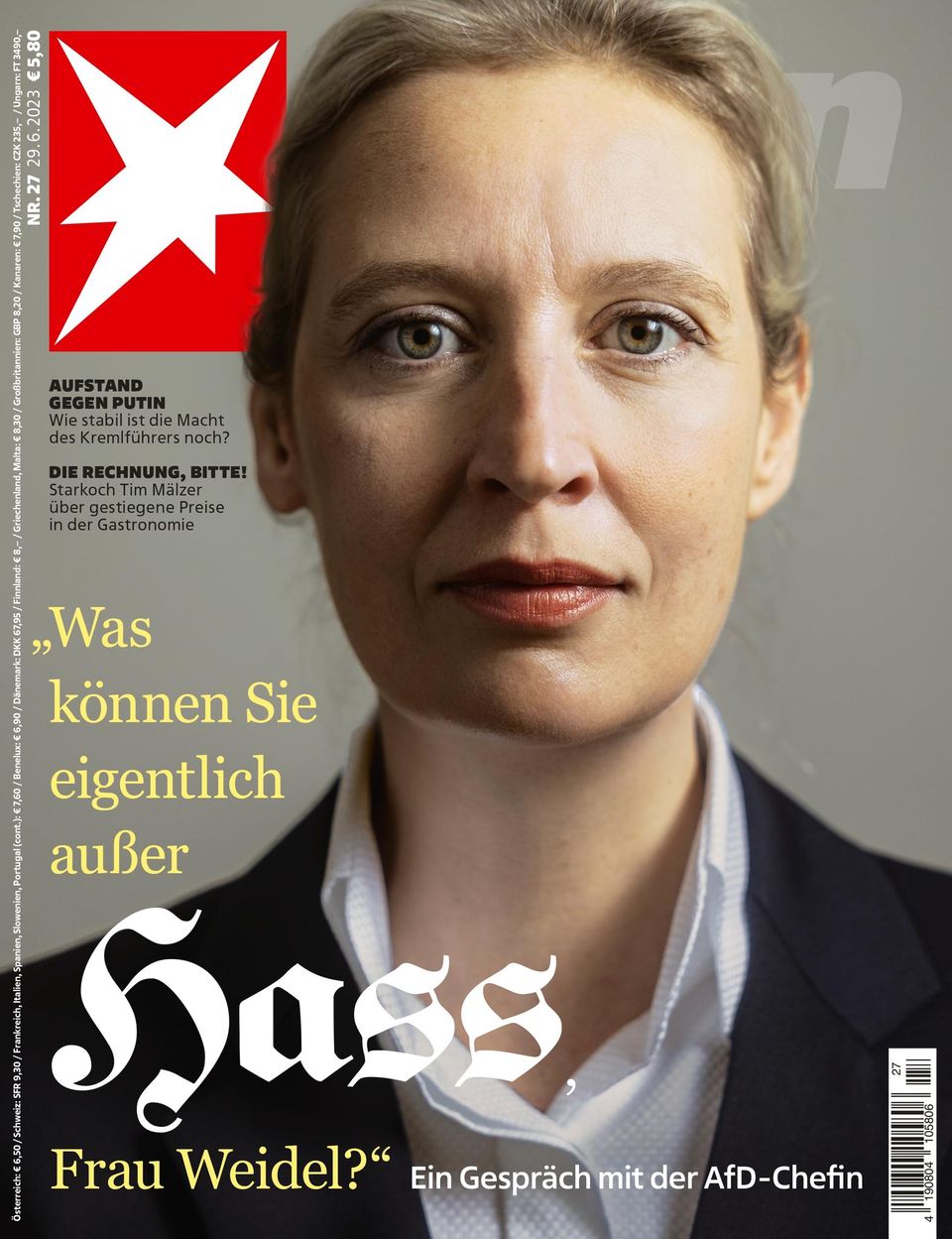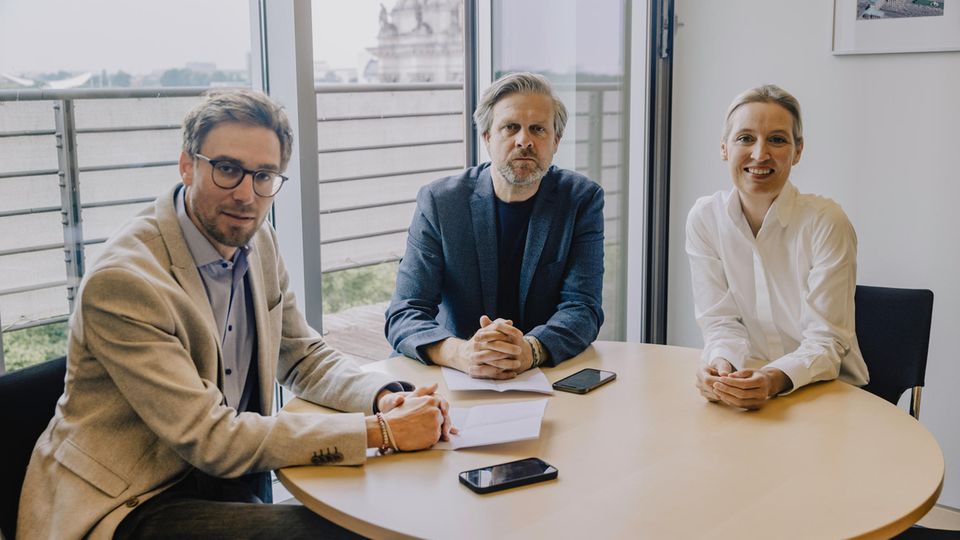In the summer we interviewed AfD leader Alice Weidel. There was praise for this, but also a lot of criticism. From the interview I learned something about us in the media – and about myself.
Making-of – that’s the name of our new format on stern.de. We want to give you a personal look behind the scenes, tell us about our everyday journalistic life, what we experience during research and what motivates us in the editorial team. We’re starting a little series looking back at our moments in 2023.
It was almost exactly six months ago that my colleague Jan Rosenkranz and I conducted an interview with Alice Weidel. I think about it often. We visited them AfD-Chairman in her Bundestag office, it was a warm day, and superficially one would have thought it was a comparatively normal appointment.
Weidel took time to take photos. She gave a tour of her rooms on the sixth floor of the Jakob-Kaiser-Haus, showed the view of the Tiergarten from her desk, and appeared relaxed and friendly. Incredibly friendly, to be precise. As if she was wearing a mask, a second skin with a smile that didn’t match the monstrosities that kept bursting out of her during the conversation.
Right-wing extremists? From their point of view, it doesn’t exist in the AfD. Officials of the EU Commission? Everyone should be fired as soon as possible. Such things.
Towards the end of the interview, I asked her about the discrepancy between her personal background and her political stances. “We sometimes wonder why one Womanwho lives with a partner from Sri Lanka…”
“…she’s Swiss,” Weidel interjected.
Then I: “…but she was in Sri Lanka born.”
“But adopted at three months old. Why do you emphasize it like that?” asked Weidel. She was obviously pleased to have recognized in me the obsession with origins that we usually criticize about the AfD.
For a brief moment I was perplexed and tried to find a way to counter what happened to journalists. But now of all times? Luckily jumped Jan one, said: “In your party’s logic, she is a migrant forever. That means the AfD doesn’t even release people who live here in the third generation.” And we were back on track.
How do we media deal with the AfD?
I still remember the moment with slight trepidation because I learned something about myself, perhaps even something about the journalistic approach to the AfD in general. Could it be that, out of a sense of moral superiority, I believed that I could confront Weidel at any time – and yet I was confronted myself?
star-Title with Alice Weidel
There has been a lot of discussion this year about how the media should report on the AfD, and we ourselves sparked some of the controversy with the interview. There was praise for our idea of interviewing Weidel and it turned into one star-title, but also a lot of criticism from colleagues on social media. The core of the criticism was that a magazine should not offer a platform to a woman whose party questions the free basic order and is partly classified as right-wing extremist. Every interview “normalizes” the AfD, especially at a time when the party seems to be growing into enormous power.
We took this criticism seriously and discussed it in the editorial team, in our Berlin office. Some criticism was justified. For example, we could have contradicted Weidel more clearly at one point or another. But persistence also has its limits because there is a risk that an interview turns into a heated interrogation and gives the impression that you always want to have the last word. That doesn’t seem confident either. Such an approach provokes sympathies, if any, with the “interrogated”.
However, I find the core of the criticism wrong for several reasons. One of them is that the previous approach of avoiding interviews with leading AfD representatives hasn’t worked very well. Otherwise the party would not be where it is in the polls. And frankly, I also find the argument with the stage unconvincing, since in the age of social media, AfD politicians like Ms. Weidel have so many of their own stages and ways to spread and present themselves that, from their point of view, interviews in magazines and newspapers seem rather dispensable.
Dare to be more unpredictable
I think we journalists have to look our top executives in the eye and not look away. The AfD is no longer a niche party; it has established itself in politics despite vile positions, or perhaps precisely because of them.
Of course, good AfD reporting includes addressing the right-wing extremist activities in the party. But looking at the experiences of this year, it seems to me that it would perhaps even help the AfD if we limited the reporting to examining the party deep into all its branches for anti-democratic tendencies. Paradoxically, journalism strengthens their outsider image when it traces their breaking of taboos, or to put it another way: the more aggressively the media tries to delegitimize the AfD, the greater its appeal becomes.
star-Editors Veit Medick (left) and Jan Rosenkranz (middle), AfD leader Weidel (far right)
© Gene Glover
This presents us journalists with a difficult dilemma: We cannot sweep the AfD’s ethos under the carpet, but at the same time we must avoid the impression that our only aim is to destroy this party. The latter is not our job either. Some may see it differently, but I believe that in the future we should balance meticulous, persistent observation with less predictability, with sober analysis that explains the attractiveness of the AfD and holds a mirror up to established parties, with reports from on the ground. And, yes, with direct discussions with their top representatives.
We journalists also learn from direct confrontation
As a journalist you also learn from such appointments, which is what I took away from the difficult moment in the Weidel conversation. Interviews with AfD politicians are a test – also for ourselves. They force us to check our approach, question our attitudes, argue less morally and be more precise in our craftsmanship in order to find the Achilles heels of right-wing populists.
If this year has shown anything, it is that the AfD has not only become more extreme, but also more professional. It communicates better than many other parties, knows exactly who it is addressing and how, and is not always, but increasingly often, prepared for a wide variety of accusations. This can create an awkward moment in interviews.
But after this year, I not only know how helpful it is to have a good interview partner at my side. I also know: conversations like these make us journalists better – not worse.




